CHANNEL CATFISH
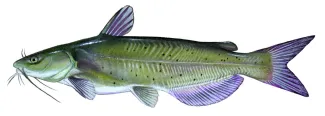
BLUE CATFISH
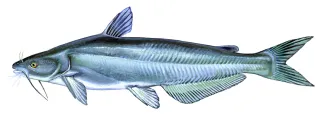
FLATHEAD CATFISH
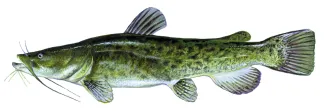
A fish fry favorite, catfish are abundant across Oklahoma and easy to catch come summertime! Aptly named catfish for the long whisker-looking barbels protruding from their face, there are three major species sought after in the state's waters: channel catfish, blue catfish and flathead catfish.
Catfish are much more active in the lowlight and overnight hours, but can be caught at any time of day.
Channel catfish are found in nearly every body of water in the state, including ponds, creeks, rivers and reservoirs. The easiest of the three species to catch, channel catfish are stocked regularly across the state by ODWC's Fisheries Division.
Native to the Red River watershed, blue catfish can now be found in most of the state's major river and reservoir systems. Prized for their sumptuous fillets and fighting ability, blue catfish are targeted year-round with some of the biggest specimens caught during the dead of winter.
Flathead catfish are the top of the fish food chain in Oklahoma. An apex predator and skilled hunter, these fish are perfectly adapted to the warm, stained waters of the state's prairie rivers and creeks. Known locally as mud-cats, Oklahoma's flathead catfish and the sport of noodling gained national notoriety during the short-lived reality TV series "Mudcats" that aired on the History Channel. Now noodlers from around the world gather each summer in Pauls Valley for the annual Okie Noodling Festival.
SPECIES PROFILE
- Oklahoma Distribution
Statewide. Channel catfish are found in nearly every body of water in the state. Flathead and blue catfish are found in most major river and reservoir systems.
- Description
Channel catfish have a forked tail as does the blue catfish. The anal fin will be curved across the bottom on channel catfish and straight line on blue catfish. Flathead catfish are darker in color and do not have a forked tail. Originally restricted to the Red River, blue catfish are now found in most sections of the state due to transplanting. Blue catfish have adapted well to the Arkansas River System.
- Habitat
Found in large rivers and major reservoirs, blue catfish generally prefer areas with sand, gravel or rock bottoms. Adult channel catfish are found near cover in larger pools and deep holes. Immature channel cats are more tolerant of fast current, frequent riffles and shallow water. Adult flathead catfish are found near cover in larger pools and deep holes. Flathead catfish like old brushy tangles, submerged logs, and undercut banks.
- Natural Food Sources
- Fish (live or dead; shad are preferred for blue catfish; sunfish are preferred for flathead catfish)
- Snails
- Crustaceans
- Insects
- Mussels
- Spawning
Spawning usually starts in late May and can run all the way into July depending on where the body of water is located in the state. Hollow logs, overhanging underwater ledges or holes under mud banks are typical nesting places. Female catfish lay about 10,000 eggs each. Males guard the eggs against intruders, including females. Eggs hatch in 6 to 10 days as determined by temperature.
After hatching, fry are attended for a short time by the male as they feed in a dense school. While spawning habits and feeding mechanisms are similar, each species varies in what they eat and how you catch them.
- Fish Facts
Flathead and blue catfish are a favorite of many anglers. Most are taken while trot-lining, jug-lining, limb-lining or noodling. Flathead catfish and blue catfish can exceed 100 pounds. Good scrappers, channel catfish when taken from clean waters are excellent table fare. Channel catfish feed more by taste and touch than by sight and rarely exceed 50 pounds.
FISHING TIPS
Unlike many popular freshwater species that feed by sight and sound, catfish primarily rely on taste and touch.
Channel catfish are opportunistic omnivores with a tendency to eat just about anything with scent that will fit in their mouth. Channel catfish are best targeted along dam riprap and creek channels. A worm and bobber is an effective way to catch lots of small- to medium-sized channel catfish along dam riprap from late April into May while they are gorging during the pre-spawn period. Punch bait, stink bait, cut bait and other scented baits fished off the bottom are also effective ways to target channel catfish along dam riprap and channels. Channel catfish are much more likely to eat non-live or non-natural baits than flathead and blue catfish.
Blue catfish are a good intermediary to channels and flatheads. Blues can be caught on both live and dead natural bait as well as artificial lures like crankbaits. Shad are the preferred food choice of blue catfish. Cut shad on a circle hook fished either off the bottom or below a float around creek channel ledges and dam riprap is an effective way to catch blues.
Flathead catfish can be an elusive fish to catch on rod and reel. Like largemouth bass, flatheads love a live bluegill, but locating and casting to flatheads can be difficult. Most anglers catch flatheads on live bait left unattended overnight with methods such as trotlines, limblines, juglines and yo-yos. For those looking to catch flatheads on rod and reel, focus your efforts in heavily wooded areas, such as coves or backwater that have lots of hollowed logs and stumps. Hook a live bluegill through the lips or between the dorsal and tail fin with a sturdy 6/0 to 10/0 circle hook attached to a 30-pound to 80-pound leader line tied to a barrel swivel with a ½- to 1-ounce weight on the main line. Cast into the woody areas and let your line soak until you get a take.
Blue and flathead catfish are excellent table fare, especially the belly meat from flatheads.
Common Catfish Brands
Habitat to Target
- Creek & River Mouths - areas of inflowing water to the main lake and connecting tributaries upstream.
- Dam Riprap - morning, evening and overnight hours in the spring, summer and fall will see catfish close to the bank.
- Open Water - areas adjacent to transition zones, such as river/creek channel ledges, creek/river mouths, wind blown sides of points and deep water flats.
- Shallow Bays - wind blown side of coves and inlets during the overnight hours.
Rod/Reel Setup
- Medium to Extra-Heavy rod
- Spinning, spincasting, baitcasting or casting reel
- 10-pound to 80-pound test line
CLEANING TIPS
COOKING TIPS
AREA HIGHLIGHTS
Southwest
NOT SUBMITTED
Northwest
- American Horse
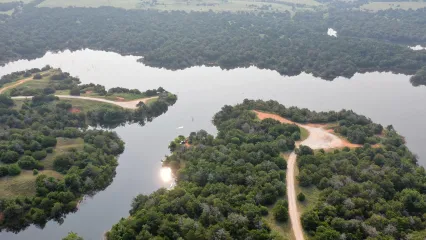
American Horse Lake
American Horse Lake was constructed by the Oklahoma Department of Wildlife Conservation in 1966. Vegetation around the lake is post-oak-blackjack forest and mixed-grass eroded plains types.
The lake has one concrete boat ramp, several picnic tables, and one water well. Geary is the nearest town in which to obtain picnic and fishing supplies. The lake supports an abundant population of good-sized bluegill and catchable-size largemouth bass.
Fishing Tips
Submitted by Fisheries Technician Mack Wood
Species of interest include channel catfish.
There are several bank access areas around the west side of the lake.
Local bait favorites include chicken liver, live worms hotdogs, dough bait and punch bait.
Fishing is best after dark. Anglers can have good success suspending bait approximately three feet above a weight on the bottom.
Daytime anglers may have more success utilizing a float above a suspended bait near the bottom keeping a weight on the end of the line.
Boat anglers can utilize the same fishing techniques as described above in harder to reach areas of the lake.
Fishing Contact
Game Warden
Operator
Oklahoma Department of Wildlife Conservation
Location
American Horse Lake (Google Map) is located in Blaine County 10 miles west of Geary (S5,T13N,R12W).
Drive Time
From OKC - 1.25 hours
From Tulsa - 2.5 hours
From Weatherford - 45 minutes
Recreational Facilities
The lake has one concrete boat ramp, several picnic tables and one water well. Geary is the nearest town in which to obtain picnic and fishing supplies. The lake supports an abundant population of good-sized bluegill and catchable size largemouth bass.
Campgrounds Nearby
Bait & Tackle Nearby
Walmart Supercenter
Roman Nose General Store
Gilchrist General Store
Walmart Supercenter
Walmart Supercenter
Lead Babies Slabs
Walmart Supercenter
Academy
Walmart Supercenter
Walmart Supercenter
Physical Description
Surface Area: 100.00 ac.
Shoreline Length - 6.80 mi.
Volume - 2,200.00 ac. ft.
Max. Depth - 75.00 ft.
Management Practices
Largemouth bass spring electrofishing and fall hoop nets to evaluate fish populations. Cedar trees are added to refurbish existing habitats.
Additional Information
- Canton

Canton Lake
Canton Lake has great access and facilities for boaters and bank anglers alike. Gently sloping sandy beaches can be found at all of the public access areas. Fishing jetties along the dam and a new recreation area below the dam offer bank anglers easy access to some of the best fishing at the lake.
Renowned as Oklahoma's premier walleye fishery, Canton Lake also supports a robust population of crappie, white bass and catfish.
Canton Lake has become the primary source of walleye eggs for incubation and stocking of other state lakes. Since 1968, community leaders and local merchants have promoted an annual Walleye Rodeo. The four-day event offers visitors the chance to win cash and other prizes that total over $30,000. The community also hosts other festivities which attract fishermen from Oklahoma and surrounding states.
Fishing Tips
Submitted by Fisheries Technician Mack Wood
Species of interest include channel catfish and flathead catfish
Rod and reel anglers can have best success around the mouth of Canadian Cove and the various access points off Thunder Road. The rip rap along the dam is also a popular spot in the month of June when catfish are up shallow spawning.
Boat anglers can have the best success running jug lines along the dam and around the islands.
Local bait favorites include cut or live shad, chicken liver, live sunfish, live worms and hotdogs.
Rod and reel anglers should suspend their bait of choice approximately three feet from the bottom underneath some type of visible float keeping a weight on the end of the line.
Fishing Contact
Game Warden
Operator
Location
Canton Lake (Google Map) is located 2 miles north of Canton and 18 miles southwest of Fairview on Highway 58.
Drive Time
From OKC - 1.75 hours
From Tulsa - 3 hours
From Weatherford - 50 minutes
Recreational Facilities
U.S. Corps of Engineers manages campgrounds with full RV hookups, boat ramps and swimming beaches. Canton WMA offers primitive access to the North Canadian River.
Find a Fishing Campground
Other Fish Species of Interest
Bait & Tackle Nearby
Gilchrist General Store
Roman Nose General Store
Walmart Supercenter
Walmart Supercenter
Walmart Supercenter
Atwoods
Academy
Walmart Supercenter
Walmart Supercenter
Walmart Supercenter
Physical Description
Surface area - 7,910 ac.
Shoreline length - 37.8 mi.
Volume - 111,310 ac. ft.
Maximum depth - 35.2 ft.
Management Practices
Fall gillnetting every year to evaluate fish population. Cedar trees are added to refurbish existing habitats.
Canton Lake Level Data
North Canadian River CFS Data
Additional Information
North-Central
- Carl Blackwell
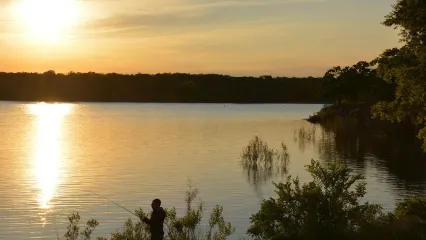
Lake Carl Blackwell
Lake Carl Blackwell is a family oriented recreational area which offers sand beaches, swimming, fishing, boating, 24-hour on-water fuel marina, a lake side convenience store, water skiing, camping, hiking, hunting, and miles and miles of exceptional equestrian riding trails.
Camping is available year-round. The lake is well known for producing large saugeye and hybrid striped bass.
Fishing Tips
Submitted by Fisheries Biologist Jeremy Duck
Areas best for channel catfish in the Summer (June - September) are the riprap around Ski Point and the dam. Boat anglers can find channel cats in the large arm west of ski point and in the flats of the western part of the lake.
Best baits are fresh cut shad, bluegill or minnows, hotdogs, stink bait or chicken livers suspended three to five feet below a large bobber. In cooler seasons, fish with a weight off the bottom of the lake for better results.
Fishing Contact
Game Warden
Operator
Location
Lake Carl Blackwell (Google Map) is located 2 miles north of SH 51 on SH 51C.
Drive Time
From OKC - 1 hour
From Tulsa - 1.25 hours
From Stillwater - 15 minutes
Recreational Facilities
Oklahoma State University manages campgrounds with full RV hookups, cabins, boat ramps, fishing docks and designated swimming areas. Ski Point boat ramp is ADA compliant.
Find a Fishing Campground
Other Fish Species of Interest
Bait & Tackle Nearby
Cowboy Corner at Lake Carl Blackwell
Lake McMurtry West Bait Shop
Walmart Supercenter
Academy
R.C. Bait and Tackle
Walmart Supercenter
Magic Bait Co
Lakeview Grocery
Walmart Supercenter
Walmart Supercenter
Physical Description
Surface area - 3,370 ac.
Shoreline length - 59.2 mi.
Volume - 61,500 ac. ft.
Maximum depth - 45.9 ft.
Management Practices
Hybrid striped bass are stocked. Saugeye are stocked to manage for quality crappie.
Additional Information
- Kaw
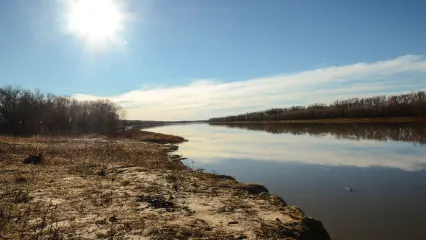
Kaw Lake
Kaw Lake is located in north central Oklahoma, approximately 8 miles east of Ponca City on the Arkansas River. Ground breaking ceremonies were held in May 1966 and impoundment of the reservoir occurred in 1976. Construction on the recreation facilities concluded in July of 1980 with the completion of the Osage Cove Public Use Area.
There are nine public use areas and two lake access points located around the lake for visitors to enjoy. Campers can select from over 300 family campsites, many of which are equipped with water and electric hookups. Groups of all types enjoy four group camping areas, three of which are located at the Osage Cove Public Use Area and one located at the Sarge Creek Cove Area. Use of the group camping areas is by reservation only. Interested parties can contact the Kaw Lake Office for reservations.
Ten boat launching ramps provide boaters with easy access to Kaw Lake. Once on the water, boaters can find two full service marinas located at McFadden Cove and Pioneer Park. Swimmers are invited to enjoy designated swimming areas at Pioneer Park and Sandy Park.
Kaw Lake and the Arkansas River have long been known for producing some of Oklahoma's largest catfish. Kaw Lake also offers anglers excellent opportunities to catch crappie, white bass and walleye
Fishing Tips
Submitted by Fisheries Biologist Jeremy Duck
Areas best for blue Catfish in the summer months (June- September) are Coon Creek, Sarge Creek, Washunga Bay and Bear Creek areas. These spots have plenty of bank access and are great areas for boat anglers to target as well in the open water. Channel or flathead catfish may be caught in these areas as well.
Kaw Lake is one of the top blue catfish lakes in the state. While not many trophy sized fish are caught, the large abundance of three to five pound blues make for lots of action and full ice chests.
Best baits are fresh cut shad, bluegill or minnows and hotdogs suspended three to five feet below a large bobber. In cooler seasons, fish with a weight off the bottom of the lake for better results.
Fishing Contact
Game Warden
Operator
Location
Kaw Lake (Google Map) is located 11 miles east of Ponca City on SH 11.
Drive Time
From OKC - 1.75 hours
From Tulsa - 1.5 hours
From Ponca City - 15 minutes
Recreational Facilities
U.S. Corps of Engineers manages campgrounds and boat ramps. Easy access to the water's edge is available in many of the public-use areas. The concrete walk along the spillway is also accessible.
Find a Fishing Campground
Other Fish Species of Interest
Bait & Tackle Nearby
Lakeview Campground, Boat Storage, Bait Shop & Store
Walmart Supercenter
Grit & Grace Outdoors
Bubba's Outdoor Sports
Academy
Lake McMurtry West Bait Shop
Keystone Lake Bait & Store
Walmart Supercenter
Walmart Supercenter
Cowboy Corner at Lake Carl Blackwell
Physical Description
Surface area - 23,610 ac.
Shoreline length - 149 mi.
Volume - 428,600 ac. ft.
Maximum depth - 74.5 ft.
Management Practices
Walleye are stocked and brush piles are put into the lake for fish habitat.
Kaw Lake Level Data
Additional Information
- Sooner
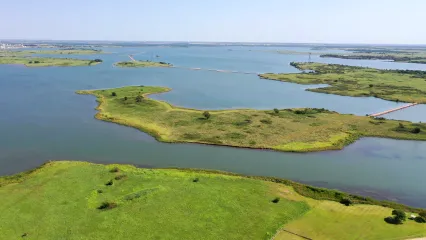
Sooner Lake
Sooner Lake is located in north central Oklahoma, approximately 25 miles north of Stillwater. It is a warm water discharge lake operated by OG&E. What the lake lacks in abundance, it makes up for it in size of fish.
Bank access is limited, but the lake is great for boats of all sizes and kayaks. OG&E manages two boat ramps.
Fishing Tips
Submitted by Fisheries Biologist Jeremy Duck
Areas best for blue catfish in summer months are the warm water side area north of the west boat ramp. Sooner does not have as much bank access as other lakes but if a person has a boat or kayak there is plenty of great fishing areas in the east part of the lake near the island.
This lake has fewer numbers of blue catfish in it and can be frustrating from the lack of bites, but the chances of a bite having a large blue catfish on the other end of the line is a lot higher.
Best baits are fresh cut shad, bluegill or minnows and hotdogs suspended three to five feet below a large bobber. In cooler seasons fish with a weight on the bottom of the lake for better results.
Fishing Contact
Game Warden
Operator
Location
Sooner Lake (Google Map) is located 25 miles north of Stillwater and 20 miles south of Ponca City on US 177.
Drive Time
From OKC - 1.5 hours
From Tulsa - 1.25 hours
From Stillwater - 40 minutes
Recreational Facilities
OG+E manages two boat ramps.
Other Fish Species of Interest
Bait & Tackle Nearby
Lakeview Campground, Boat Storage, Bait Shop & Store
Walmart Supercenter
Grit & Grace Outdoors
Bubba's Outdoor Sports
Academy
Lake McMurtry West Bait Shop
Keystone Lake Bait & Store
Walmart Supercenter
Walmart Supercenter
Cowboy Corner at Lake Carl Blackwell
Physical Description
Surface area - 5,400 ac.
Shoreline length - 51.8 mi.
Volume - 149,000 ac. ft.
Maximum depth - 73.5 ft.
Management Practices
Florida strain largemouth bass, hybrid striped bass and saugeye are stocked. Brush piles are put into the lake for fish habitat.
Additional Information
Northeast
- Claremore
- Image
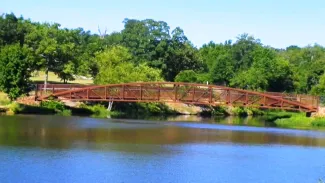
Claremore Lake
Developed in 1929 with the completion of the dam, Claremore Lake Park has been a source of family-friendly outdoor relaxation for nearly a century. This city park features a splash pad and two playground areas perfect for letting the little ones in your crowd frolic. Breathe in the fresh country air while taking advantage of the park's walking trails.
When it comes to fishing, Claremore Lake Park makes getting your line in the water easy with boat ramps, docks and two fishing docks (one enclosed with heat and air). Duck hunting is allowed with a permit for those who win a draw for the 20 duck blind slots on Claremore Lake each season. Picnic areas, outdoor grills, picnic shelters and more are available to enhance your experience at Claremore Lake Park. Visit the website for more information on reserving a shelter or entering the duck blind draw.
Fishing Tips
Submitted by Fisheries Biologist Chris Wisenhunt
Channel catfish can be found along the upper end of the lake, along the north shoreline, in and around mud flats during spring and summer months.
Channel catfish begin feeding as water temperatures rise in late spring and throughout the summer months (April through September). These fish feed on almost anything, with the best baits being cut bait, worms, commercial or homemade “stink” baits, or even pieces of hot dogs. It’s often best to fish close to the bottom of the lake in the shallow flats or near cut banks.
There are multiple publicly accessible shoreline locations around the lake, but also some private property to be aware of when finding places for bank access. There is a public boat ramp located near the Lake Ranger building inside Claremore Lake Park.
A city permit is required for fishing the lake unless proof of residency for the City of Claremore is provided.
Fishing Contact
Game Warden
Operator
Location
Claremore Lake (Google Maps) is located in Rogers County in the town of Claremore.
Drive Time
From OKC - 2.25 hours
From Tulsa - 35 minutes
From Claremore - 5 minutes
Recreational Facilities
Rated as a top attraction on TripAdvisor.com, Claremore Lake is the ideal spot for family fun, with more than four miles of paved paths perfect for running, walking, and cycling. There are two playgrounds for the younger visitors, as well as five shelters, two of which are available for private rental. Throughout the park are tables and grills for public use. Claremore Lake is also home to the city’s newest splash pad, with indoor public restrooms adjacent. The park is clean and quiet, with plenty of green space for activities. A wheelchair-accessible fishing pier is located near the Lake Ranger's office. For additional info contact Rogers County, (918) 341-1238.
Find a Fishing Campground
Other Fish Species of Interest
Bait & Tackle Nearby
The Tackle Box
Lazy J's Tackle
JD Tackle Box
Nabatak Outdoors
Walmart Supercenter
Walmart Supercenter
Walmart Supercenter
Big Daddy's Lures
Pokey's Trading Post Bait & Tackle Shop
North Harvard Bait
Physical Description
Surface area - 621 ac.
Shoreline length - 17.8 mi.
Volume - 5,188 ac. ft.
Maximum depth - 24.3 ft.
Additional Information
- Close to Home Ponds - Tulsa Area
Veterans Park Pond, Kelly Lane Pond, Hunter Park Pond, Mohawk Park Pond, Braden Park Pond and Lee Lake.
Fishing Tips
Submitted by Fisheries Biologist Chris Wisenhunt
Channel catfish are routinely stocked into many of our Close-to-Home waters across the state to provide angling opportunities in highly urbanized communities.
Most channel catfish stocked in these waterbodies are hatchery raised fish that are accustomed to commercial fish food. Therefore, most commercial “stink” baits or similar type baits are often very effective as well as worms and nightcrawlers. It’s often best to fish close to the bottom in four to five feet of water. Channel catfish feed more actively when temperatures get warmer in mid to late spring and feed throughout the summer months into early fall.
Close-to-Home Fishing Program ponds have special, more restrictive fishing and harvest regulations, so be sure to read and understand all current regulations before fishing at these locations.
Most ponds in the Close-to-Home Program have almost complete shoreline access with some ponds (Veterans Pond in Jenks and Hunter Park Pond in Tulsa) have fishing docks that are handicap accessible.
- Eucha

Lake Eucha
Operated by the City of Tulsa. There is a boat ramp located at the Upper Spavinaw Recreation Area off of 468 Road East of the Brush Creek Bridge, and west of the Brush Creek Bridge. There is a boat ramp and fishing dock at Lake Eucha Park on the northwest side of the State Highway 10 Bridge. A boat ramp is located at the Lake Eucha Permit Office on the Southwest side of the highway 10 bridge. Eucha Point has a boat ramp and fishing dock. There is a ramp just to the northeast of the Eucha Dam off of E 440 Road.
Fishing Tips
Submitted by Fisheries Technician Kendall Robbins
Eucha and Spavinaw are two beautiful lakes operated by City of Tulsa. Channel catfish and flathead catfish can both be found at these lakes.
There is a lot of lake access via several boat ramps and quite a few floating fishing docks.
Neither of these lakes are more than 3,000 surface acres which makes them good smaller lakes to target catfish on.
You will need a permit to fish these lakes that you can obtain from the City of Tulsa lake offices. This City of Tulsa permit is in addition to the ODWC fishing license.
Cut shad, chicken livers or a commercial stink bait would all be good options to use for bait for channel catfish. Flathead catfish prefer live bait such as shad, bluegill, or other species of sunfish.
These species of catfish can be targeted by the traditional rod and reel method, as well as jug and trot lines.
Fishing Contact
Game Warden
Operator
Location
Lake Eucha (Google Map) is located 4.5 miles south of Jay on US 59.
Drive Time
From OKC - 3 hours
From Tulsa - 1.25 hours
From Miami - 1 hour
Recreational Facilities
City of Tulsa manages campgrounds and boat ramps.
Other Fish Species of Interest
Bait & Tackle Nearby
Blue Water Bait & Tackle
Benge Creek Outfitters
Blue Moon Bait & Tackle
Ketch-um Bait Shop
Honey Creek Outdoors
Grand Lake Sports Center
Walmart Supercenter
Littlefield's Sporting Goods
Gibson Bait & Tackle
Big Daddy's Lures
Walmart Supercenter
Physical Description
Surface area - 2,812 ac.
Shoreline length - 48 mi.
Volume - 74,456 ac. ft.
Maximum depth - 83.2 ft.
Management Practices
Florida strain largemouth bass have been stocked since 2016.
Eucha Lake Level Data
Additional Information
- Grand
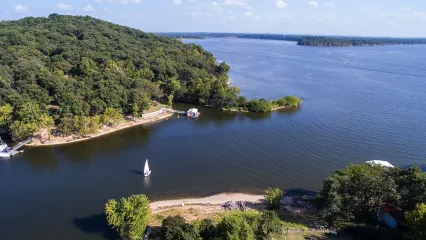 Tom Whipple/RPS 2018
Tom Whipple/RPS 2018Grand Lake
Operated by the Grand River Dam Authority (GRDA), Grand Lake is one of Oklahoma's premier fisheries. Grand Lake has hosted two Bassmaster Classics (2013, 2016) and MLF Redcrest (2022). It is a renowned largemouth bass fishery, but boasts robust populations of catfish, crappie, white bass and paddlefish. Being a destination fishery, Grand Lake offers ample lodging and accommodations.
Fishing Tips
Submitted by Fisheries Technician Kendall Robbins
Channel, blue and flathead catfish can all be found at Grand Lake and in great numbers at that! Grand Lake sets up good for year-round catfishing opportunities with its mix of deep channels, bluff channel swings, and adjacent flats. Steep ledges near a flat are great places to find catfish. Shad are key to finding catfish for most of the year and Grand Lake has great shad abundances.
All three species are abundant throughout the lake. Cut shad, chicken livers or a commercial stink bait would all be good options to use for bait when targeting channel and blue catfish.
Flathead prefer live bait such as shad, bluegill or other sunfish species. They can be caught on cut bait as well though.
All three species of catfish can be caught using different methods such as rod and reel, jug or trot lines, as well as noodling.
The tailrace below Pensacola dam (as well as the flood gates when open) make for some of the best rod and reel blue catfish angling opportunities in the state. The swift currents below dams can be dangerous so make sure that safety precautions are adhered to if you choose to try it.
Be sure to look at statewide limits and restrictions regarding the method you plan to use.
Fishing Contact
Game Warden
Operator
Location
Grand Lake (Google Map) is located 15 miles east of I-44 in between US 60, SH 82, SH 28, SH 10 and US 59.
Drive Time
From OKC - 3 hours
From Tulsa - 1.25 hours
From Miami - 15 minutes
Recreational Facilities
Grand River Dam Authority and Oklahoma State Parks manage campgrounds with full RV hookups, boat ramps, fishing docks and designated swimming areas.
Find a Fishing Campground
Other Fish Species of Interest
Bait & Tackle Nearby
Blue Water Bait & Tackle
Benge Creek Outfitters
Blue Moon Bait & Tackle
Ketch-um Bait Shop
Honey Creek Outdoors
Grand Lake Sports Center
Walmart Supercenter
Littlefield's Sporting Goods
Fairland Bait & Tackle
Shawnee Grocery
Walmart Supercenter
Physical Description
Surface area - 41,749 ac.
Shoreline length - 460 mi.
Volume - 1,515,414 ac. ft.
Maximum depth - 133 ft.
Management Practices
Hybrid striped bass are regularly stocked.
Spring River CFS Data
Neosho River CFS Data
Grand Lake Level Data
Additional Information
- Keystone
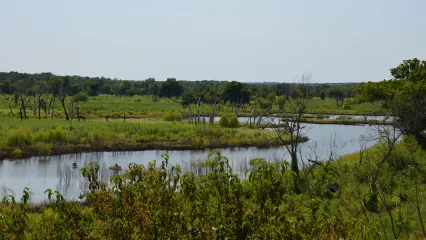
Keystone Lake
The Arkansas River begins at the base of Keystone Lake dam and has public access points for several miles downstream to the city of Jenks.
Fishing Tips
Submitted by Fisheries Biologist Chris Wisenhunt
Blue catfish can be found adjacent to the main channels of the Arkansas and Cimmaron Rivers, usually in the upper portions of the rivers as well as near rocky bluffs in the main lake.
Early spring (March through May) is often the best time for targeting big blues, but they can be caught almost year-round. Blue catfish often prefer more riverine habitats of main lake channels in the upper end of lakes, so fishing in those areas should increase your chances.
Blues primarily feed on live fish, such as shad and sunfish, as well as a variety of freshwater mussels, crayfish, and insects.
When fishing, live bait or fresh cut bait on circle hooks fished along the bottom, in mud flats near channel bends or adjacent to the main channel are often the most successful ways to catch these fish.
Rod and reel fishing can be successful if patience is practiced, but many anglers resort to jug fishing adjacent to the main channel with shad to catch large numbers of blues.
Some of the best areas on Keystone Lake for blues are up the Arkansas River near Cowskin Bay and the confluence with Waresha Creek, the Salt Creek area along the channel bluff just south of Highway 51 bridge, and the Cimarron River arm of the lake along the bluff near Houseboat Island.
Flathead Catfish are often found along the banks or shallow water where they can build nesting cavities, often within rock ledges or log jams during spawning season (May through July).
Adult flathead catfish feed almost exclusively on live fish, so live bait, such as shad on a circle hook, are best.
During the spawning season, target the rocky bluffs in Salt Creek south of Highway 51 bridge, the Cimarron arm near Akdar Shrine Campground, or along the rocky banks of the Arkansas River arm near Cowskin Bay and Waresha Creek.
Noodling for flathead catfish is also a popular method for catching these fish.
In those same areas mentioned above, during spawning season, flathead catfish will often build nests in cavities along the bank, often under rocks or broken concrete from old roadbeds or boat ramps. Finding those nests will often result in the opportunity to catch an adult fish by hand.
It is highly recommended that when noodling, you go with someone with experience as it can be dangerous if you are unfamiliar with the hazards associated with hand fishing.
Access areas with boat ramps include Cowskin Bay (COE); Walnut Creek Park (COE); Washington Irving (COE); Appalachia Bay (COE); Keystone Ramp (COE); Prairie View Boat Ramp (City of Mannford).
Fishing Contact
Game Warden
Operator
Location
Keystone Lake (Google Map) is located 8 miles west of Sand Springs on US 412 and SH 51.
Drive Time:
From OKC - 1.75 hours
From Tulsa - 30 minutes
From Stillwater - 50 minutes
Recreational Facilities
U.S. Corps of Engineers and Oklahoma State Parks manages campgrounds with full RV hookups, boat ramps and designated swimming areas around Keystone Lake.
Find a Fishing Campground
Other Fish Species of Interest
Bait & Tackle Nearby
Bait Shop
Woody's Bait & Tackle
Keystone Lake Bait & Store
Walmart Supercenter
Keystone Lake Level Data
- Oologah
 Ashlee Boswell/RPS 2020
Ashlee Boswell/RPS 2020Oologah Lake
The dam and lake were built by the U.S. Army Corps of Engineers. The project was authorized by the Flood Control Act of 1938 and construction began in 1950. In 1951, construction was halted and resumed in 1955. In 1963, the majority of the project was complete and all facilities were in 1974. In 1976, the City of Tulsa built a pipeline connecting Oologah to the Lynn Lane Reservoir in Tulsa.
Recreation opportunities include a swimming beach, mountain biking, marina, RV and tent camping, picnic tables and a playground. On the east side of the lake, the Will Rogers Country Centennial Trail (18 miles) winds around the shore from the Spillway to Blue Creek Park.
Famous American actor, philosopher, cowboy, and writer, Will Rogers, was born on the Dog Iron Ranch which now sits on the shores of Oologah Lake.
Fishing Tips
Submitted by Fisheries Biologist Chris Wisenhunt
Blue catfish often prefer more riverine habitats of main lake channels in the upper end of lakes, so fishing in those areas should increase your chances.
Early spring (March through May) is often the best time for targeting big blues, but they can be caught almost year-round. Blues primarily feed on live fish, such as shad and sunfish, as well as a variety of freshwater mussels, crayfish, and insects.
When fishing, live bait or fresh cut bait on circle hooks fished along the bottom, in mud flats near channel bends or adjacent to the main channel are often the most successful ways to catch these fish.
Rod and reel fishing can be successful if patience is practiced, but many anglers resort to jug fishing adjacent to the main channel with shad to catch large numbers of blues.
Best places to fish on Oologah Lake are areas adjacent to the main channel on east and north ends of Goose Island up to the upper end of the lake near Double Creek. The riprap areas around Winganon Bridge are often popular areas to fish from the bank.
Access areas with boat ramps include Blue Creek (COE); Clermont Park (COE); Spencer Creek (COE); Sunny Side Boat Ramp (Town of Talala); Winganon East Side Ramp (ODWC); Double Creek (City of Nowata)
Fishing Contact
Game Warden
Operator
Location
Oologah Lake (Google Map) is located just east of Oologah on US 169 and SH 88.
Drive Time
From OKC - 2.25 hours
From Tulsa - 40 minutes
From Claremore - 15 minutes
Recreational Facilities
U.S. Corps of Engineers manages campgrounds with full RV hookups and boat ramps.
Find a Fishing Campground
Other Fish Species of Interest
Bait & Tackle Nearby
The Tackle Box
Lazy J's Tackle
JD Tackle Box
Nabatak Outdoors
Walmart Supercenter
Walmart Supercenter
Walmart Supercenter
Fischer Bait & Tackle
Mister Bass Inc
North Harvard Bait
Physical Description
Surface area - 29,460 ac.
Shoreline length - 216.9 mi.
Volume - 544,100 ac. ft.
Maximum depth - 72.2 ft.
Management Practices
Hybrid striped bass and walleye are regularly stocked.
Oologah Lake Level Data
Additional Information
- Spavinaw
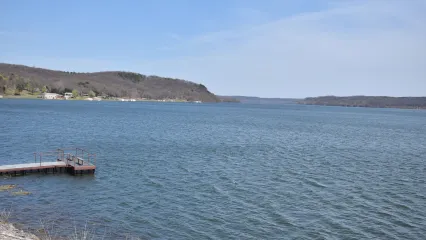
Spavinaw Lake
Operated by the City of Tulsa. There are two boat ramps, as well as a couple public fishing docks, on the northwest side of the lake off of Lake Street.
Fishing Tips
Submitted by Fisheries Technician Kendall Robbins
Eucha and Spavinaw are two beautiful lakes operated by City of Tulsa. Channel catfish and flathead catfish can both be found at these lakes.
There is a lot of lake access via several boat ramps and quite a few floating fishing docks.
Neither of these lakes are more than 3,000 surface acres which makes them good smaller lakes to target catfish on.
You will need a permit to fish these lakes that you can obtain from the City of Tulsa lake offices. This City of Tulsa permit is in addition to the ODWC fishing license.
Cut shad, chicken livers or a commercial stink bait would all be good options to use for bait for channel catfish. Flathead catfish prefer live bait such as shad, bluegill, or other species of sunfish.
These species of catfish can be targeted by the traditional rod and reel method, as well as jug and trot lines.
Fishing Contact
Game Warden
Operator
Location
Spavinaw Lake (Google Map) is located just south of Spavinaw on SH 20.
Drive Time
From OKC - 3 hours
From Tulsa - 1.25 hours
From Miami - 1 hour
Recreational Facilities
City of Tulsa manages two boat ramps. Oklahoma State Parks manages a primitive campground.
Other Fish Species of Interest
Bait & Tackle Nearby
Blue Water Bait & Tackle
Benge Creek Outfitters
Blue Moon Bait & Tackle
Ketch-um Bait Shop
Honey Creek Outdoors
Grand Lake Sports Center
Walmart Supercenter
Littlefield's Sporting Goods
Gibson Bait & Tackle
Big Daddy's Lures
Walmart Supercenter
Physical Description
Surface area - 1,548 ac.
Shoreline length - 23.3 mi.
Volume - 26,250 ac. ft.
Maximum depth - 45.7 ft.
Spavinaw Lake Level Data
Additional Information
East-Central
- Robert S. Kerr
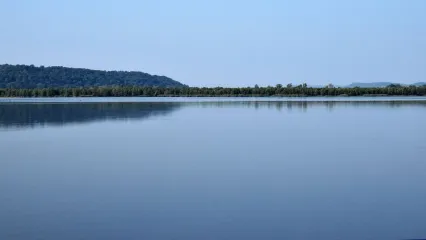
Robert S. Kerr Reservoir
Operated by US Army Corps of Engineers. Impounded in 1970, R.S. Kerr is the 15th pool along with the McClellan Kerr navigation system. R.S. Kerr is the 3rd largest lake in Oklahoma at 43,800 surface acres. In typical Arkansas river valley fashion, much of the lake is shallow, and there are many islands and sand bars, especially in the mid to upper areas of the lake. Major tributaries that are popular places to fish are the Illinois and Canadian Rivers and San Bois and Sallisaw creeks. Most recreation on R.S. Kerr is either hunting or fishing-related.
Fishing Tips
Submitted by Fisheries Biologist Jon West
Whether from a boat or the bank, the R.S. Kerr pool (15) of the Arkansas river is an excellent place to go catfishing in Oklahoma. With a normal pool size of 43,800 surface acres, there is no shortage of fishing holes.
Bank fishing opportunities in the upper end of the lake include below Webbers Falls dam, Summers Ferry access point near Gore, Dirty Creek and Stoney Point. These areas get you within casting distance to the river channel so you can fish deep if you need to.
Popular bank fishing areas in the lower end of the lake include Applegate cove and Cowlington point Corps areas. Most of these areas also provide a boat ramp for those who have a boat and want to get away from the shoreline.
This is big water with the potential for big fish so plan on bringing heavy tackle. Bank fisherman should use larger surf-type rods to get extra distance on the cast.
You’ll want a variety of sinker sizes to choose from and the ubiquitous bank style sinker is always a favorite. Keeping an extra spool of line with you to tie on leaders and having several sizes and styles of barrel swivels on hand will afford you some flexibility with your bait presentation.
Circle hooks have become very popular for catfishing, and they are designed to reduce deep hooking and basically set themselves. It’s a good practice to snell your circle hooks with your preferred leader coming up the back of the hook shank, this provides the circle hook with the leverage to set properly, and you’ll have a number of hooks pre-rigged when it’s time to go fishing. If you decide to use a circle hook the traditional sweeping hookset is not necessary, simply reel down on the fish to apply pressure.
Fresh cut bait is the best and the gizzard shad is king due simply to the fact that they comprise so much of the diet of blue catfish and are relatively easy to get.
Other excellent bait options for Kerr include skipjack, punch baits and dough baits.
Also, a lot of people like to experiment with creating their own bait types for channel and blue cats and recipes can be found using an internet search.
Flathead prefer live bait and live sunfish are the go-to bait in that instance. When fishing for flatheads you’ll want to fish near structure like logs, bluffs and undercuts.
During pre-spawn and spawn all catfish will be near spawning type cover like riprap, bluffs and chunk rock since they are looking for a cavity in which to build a nest. Once the spawn is over the blues will move to areas like flats and channel edges and follow the schooling bait while flatheads will generally stay near their cover.
Fishing for catfish appeals to such a large swath of anglers because it can be so varied in the approach. It can be a nice way to relax near the water using only a single rod propped against a forked stick, running some jugs or a trotline, or a fast action multi-rod affair where you have to be constantly on watch and baiting hooks.
However you decide to catfish, you’re sure to have fun.
Fishing Contact
Game Warden
Operator
Location
Robert S. Kerr Reservoir (Google Map) is located 7 miles south of I-40 on US 59.
Drive Time
From OKC - 2.5 hours
From Tulsa - 1.5 hours
From Muskogee - 50 minutes
Recreational Facilities
U.S. Corps of Engineers manages campgrounds and boat ramps.
Find a Fishing Campground
Other Fish Species of Interest
Bait & Tackle Nearby
Walmart Supercenter
JJ's Bait Shop
Gore Bait & Tackle
Atwoods
Double K Bait & More
D&J Bait N Grub
Jimmy Houston Outdoors Store
Walmart Supercenter
Belle Starr Marina
Mike's Outdoors
Physical Description
Surface area - 43,800 ac.
Shoreline length - 278 mi.
Volume - 493,600 ac. ft.
Maximum depth - 52.5 ft.
Management Practices
Sauger and walleye are subject to a 16" minimum to protect sauger broodstock.
Robert S. Kerr Lake Level Data
Additional Information
Southeast
- Coon Creek
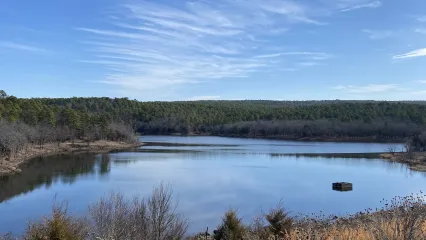
Coon Creek Lake
Approximately half the lake falls within the Robbers Cave WMA with the western half of the lake being part of Robbers Cave State Park. About half the shoreline is fairly suitable to bank fishing. There is no developed boat ramp but a gentle sloping bank allows the launching of boats on the north side of the lake, user assumes all risks. Excellent lake for fishing from smaller craft such as canoes or kayaks.
Fishing Tips
Submitted by Fisheries Technician Mike Williams
Coon Creek has easy to fish shoreline. There are multiple down trees and brush piles within casting distance of shore on the north and east side of the lake. Easy to launch out of a canoe or kayak. There is a small boat launch on the north side of the lake.
A popular catfish set up is slip sinker rig. Tie a weight to the end of the main line and 1 foot above add a medium hook. Choose what bait you want to use which can be fresh cut bait, liver, stink bait, minnows, or a simple worm.
Simply add a bobber one foot above your hook when fishing water 6 - 8 feet in depth. Then slowly drift bait along the wood rich or weedy areas. This set up you can easily snag your line but payoffs can be big.
Fishing Contact
Game Warden
Operator
Location
Coon Creek Lake (Google Map) is located two miles south of the town of Wister on US 270.
Drive Time
From OKC - 2.5 hours
From Tulsa - 2 hours
From McAlester - 40 minutes
Recreational Facilities
Oklahoma State Parks manages campgrounds with full RV hookups, cabins and trails for hiking, ATVs and equestrian.
Find a Fishing Campground
Other Fish Species of Interest
Bait & Tackle Nearby
B & B Bait & Tackle
Atwoods
JJ's Bait Shop
Walmart Supercenter
Sardis Lake Custom Lures
Double K Bait & More
Lakeside One Stop
Rebel Bait Shop
B & B Bait & Tackle
Eufaula Cove Marina
Flamingo Fish & Marine
Physical Description
Surface area - 34 ac.
Shoreline length - 1.4 mi.
Maximum depth - 35 ft.
- Eufaula
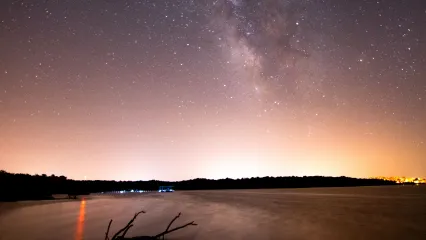 Shi Annlngalls/RPS 2019
Shi Annlngalls/RPS 2019Eufaula Lake
Eufaula Lake, the largest reservoir in Oklahoma at 105,500 surface acres, was impounded in 1964. It is operated by the United States Army Corps of Engineers for the purposes of flood control, water supply, hydroelectric power and navigation. Historically, water level fluctuations, turbidity and siltation have created management challenges.
A 14-inch minimum length limit on black bass was enacted in 1987 to increase the number of spawning size bass in the lake. Florida strain largemouth bass were first stocked in the 1980s and continue to be stocked frequently. Reservoir-strain smallmouth bass were first stocked in the lake in 1992 and stockings continued until 1998. Eufaula Lake is an excellent crappie, white bass and catfish fishery.
Fishing Tips
Submitted by Fisheries Biologist Michael Hollie
Eufaula Lake is an excellent catfish fishery. Channel catfish, blue catfish and flathead catfish can be found lake wide, however, fishing near the mouths of the larger tributaries that flow into the lake can often offer greater success.
Deep Fork River, North Canadian River, South Canadian River, Gaines Creek and Duchess Creek are just a few areas within the lake that would be worth casting a line.
Eufaula Lake offers many U.S. Army Corps of Engineers managed recreational areas, marinas, Wildlife Management Areas and State Parks where catfishing from the bank is possible
Catfish can be targeted year-round using a variety of methods, including rod and reel, jug lines, trot lines, noodling, etc., though their locations can vary based on water temperatures.
Bank anglers might have better success during late spring and early summer when catfish tend to be shallower for spawning activity. Fishing efforts should be focused near areas with potential spawning cavities like rip rap, logs and steep banks.
During the warm summer months, bank anglers will have better success fishing after sunset when catfish move up shallow as the water cools down. Passive gears like jug lines and trot lines are also popular during the summer months. They should be checked frequently each day, high water temperatures and low oxygen levels could cause fish to die and spoil quickly.
Cut bait, live shad and live sunfish are always great options for catfish.
Fishing Contact
Game Warden
Operator
Location
Eufaula Lake (Google Map) is located 10 miles south of I-40 on US 69.
Drive Time
From OKC - 2 hours
From Tulsa - 1.5 hours
From Henryetta - 40 minutes
Recreational Facilities
U.S. Corps of Engineers and Oklahoma State Parks manage campgrounds with full RV hookups, boat ramps, marinas, designated swimming areas and trails for hiking, biking, equestrian and ATVs. Eufaula Lake State Park (918) 689-5311 and Belle Starr Marina (918) 689-2132 offer an enclosed fishing dock.
Find a Fishing Campground
Lake Eufaula State Park (Arrowhead Area)
Other Fish Species of Interest
Management Practices
Florida strain largemouth bass are stocked frequently. Fish attractors are maintained to help increase angler success.
Bait & Tackle Nearby
Eufaula Cove Marina
Flamingo Fish & Marine
B & B Bait & Tackle
Belle Starr Marina
Newman Wholesale Fishing Tackle Distribution
Lake Eufaula Marina
Lakeside One Stop
Double K Bait & More
Walmart
Walmart Supercenter
Physical Description
Surface area - 105,500 ac.
Shoreline length - 833.9 mi.
Maximum depth - 90.2 ft.
Volume - 2,330,000 ac. ft.
Eufaula Lake Level Data
Additional Information
- Kiamichi River
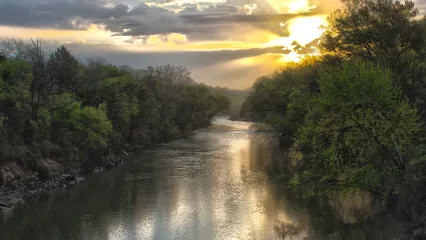
Kiamichi River
The Kiamichi River flows out of Hugo Dam about 25 miles southeast until its confluence with the Red River. There are good opportunities to catch Blue, Channel, and Flathead Catfish along with species moving up from the Red River such as Paddlefish and Alligator Gar.
Fishing Tips
Submitted by Fisheries Technician Madison Mitchell
This river has many access points, the most popular includes Kiamichi Park (Antlers, OK), Rattan Landing (Rattan, OK), Fraiser Creek (Apple, OK). Each location has a boat ramp with Kiamichi Park as the least assessable, with a small dirt ramp. Both Rattan Landing and Fraiser Creek have good parking and paved ramps. All locations have limited to no shore access.
During large rain events the river will rise and make for an excellent catfish location. When water is flowing well, use three to five ounce weights on your line with a leader 12 inches below your weight and swivel attached to your hook hook.
Bait can be one of several options including cut shad, worms, stink bait and live sunfish. Other baits can be used, catfish are not picky eaters.
Cast into swift water and wait for your weight to settle. Once you get a bite, let the fish have the bait for a few bites then set the hook.
When water is not swift, catfish are still available, but they are harder to find. Using similar methods as above find deep holes or steep drop offs in the water. Use smaller weight and a bobber for fishing calm water.
Fishing Contact
Game Warden
Location
Kiamichi River is located above and below Hugo Lake 7 miles east of Hugo on US 70.
Drive Time
From OKC - 3 hours
From Tulsa - 2.5 hours
From Durant - 1 hour
Recreational Facilities
U.S. Corps of Engineers and Little Dixie Community manage campgrounds with full RV hookups, cabins, boat ramps, designated swimming areas and trails for hiking, biking, and equestrian.
Find a Fishing Campground
Other Fish Species of Interest
Bait & Tackle Nearby
Red Barn Propane - Bait, Tackle
Walmart Supercenter
JC's Store
Walmart Supercenter
Walmart
Hookers Live Bait Fire & Ice
Beavers Bend Marina
Playin Hooky Bait Tackle and More
Sardis Lake Custom Lures
Hugo Lake Level Data
- Ozzie Cobb
Ozzie Cobb Lake
The habitat around the lake consists of cattails, rush, lilies, and water willow. A large portion of the north and northeast part of the lake is very shallow. The lake has four marked fish attractors made up of brush piles. Staff refurbished these attractors in 2020. Work is ongoing to provide camping opportunities and enhance bank angler access but has been hampered by vandalism to siphon and parking areas. Access roads that did not lead to the water have closed due to littering/dumping. If you witness vandalism or illegal dumping please call (580) 513-5014 to report.
Fishing Tips
Submitted by Fisheries Technician Madison Mitchell
The many fishing jetties are popular spots to start fishing. These easily accessible areas are excellent for all level of experience.
Catfish are primarily near the bottom and not picky eaters. With or without a bobber, weigh bait to the bottom and wait for the action. Anglers can experiment with different baits, including, liver, worms, cut bait, stick bait, and dough baits. Its good to have different baits to lure a bite. Catfish can be deceiving when they take the bait, anglers should wait to set the hook until the feel a firm pull from the catfish.
A kayak or boat is needed to reach deeper areas of the lake that may have better chances at catfish. Look for a solid bottom and you’re sure to find a few catfish waiting.
There is only one boat access point for the lake, but all sides of the lake can be utilized.
Fishing Contact
Game Warden
Operator
Oklahoma Department of Wildlife Conservation
Location
Lake Ozzie Cobb (Google Map) is located 3.5 miles northeast of SH 3 off of N4295 Rd via Cloudy Rd.
Drive Time
From OKC - 3 hours
From Tulsa - 2.75 hours
From Durant - 1.5 hour
Recreational Facilities
ODWC manages a primitive camping area and primitive boat ramp.
Find a Fishing Campground
Other Fish Species of Interest
Bait & Tackle Nearby
Red Barn Propane - Bait, Tackle
Walmart Supercenter
JC's Store
Walmart Supercenter
Walmart
Hookers Live Bait Fire & Ice
Beavers Bend Marina
Playin Hooky Bait Tackle and More
Sardis Lake Custom Lures
Physical Description
Surface area - 58 ac.
Shoreline length - 3.1 mi.
Maximum depth - 22 ft.
Volume - 833 ac. ft.
Additional Information
- Wayne Wallace
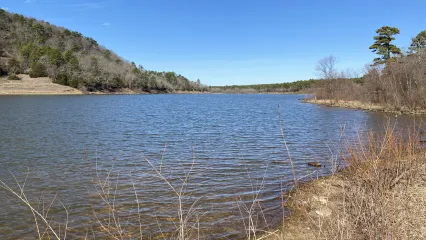
Wayne Wallace Lake
Situated in the heart of Robber's Cave State Park, Wayne Wallace Lake provides stunning views and great fishing.
Fishing Tips
Submitted by Fisheries Technician Mike Williams
Wayne Wallace is located inside Robber’s Cave State Park. Half the lake has easy shoreline access from the campsites on the north end and west side of the lake. Two fish attractors are within casting distance from shoreline. Easy launching for boats and small watercraft vessels.
A popular catfish set up is slip sinker rig. Tie a weight to the end of the main line and add a medium size hook one foot below the weight. Choose what bait you want to use which can be fresh cut bait, liver, stink bait, minnows, or a simple worm.
Fishing Contact
Game Warden
Operator
Location
Wayne Wallace Lake (Google Map) is located 6.5 miles north of US 270 on SH 2.
Drive Time
From OKC - 2.5 hours
From Tulsa - 2 hours
From McAlester - 40 minutes
Recreational Facilities
Oklahoma State Parks manages campgrounds with full RV hookups, cabins and trails for hiking, ATVs and equestrian. ODWC manages primitive campgrounds only during open deer and turkey hunting seasons that are part of Robbers Cave WMA. Primitive camping can also be found at James Colllins WMA.
Find a Fishing Campground
Other Fish Species of Interest
Bait & Tackle Nearby
B & B Bait & Tackle
Atwoods
JJ's Bait Shop
Walmart Supercenter
Sardis Lake Custom Lures
Double K Bait & More
Lakeside One Stop
Rebel Bait Shop
B & B Bait & Tackle
Eufaula Cove Marina
Flamingo Fish & Marine
Physical Description
Surface area - 94 ac.
Shoreline length - 3.1 mi.
Maximum depth - 45.2 ft.
Volume - 1,516 ac. ft.
Additional Information
South-Central
- Texoma
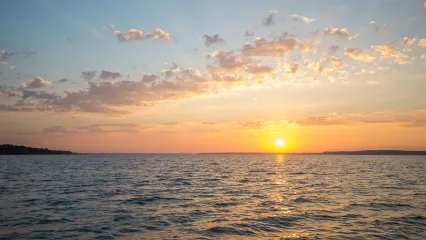
Lake Texoma
The freshwater striped bass capital of the world, Lake Texoma is a boundary lake, formed by the Denison Dam on the Red River, that separates Oklahoma and Texas. While temperate bass species and blue catfish dominate the Lake Texoma fishing headlines, it is also a fantastic black bass and crappie fishery.
Fishing Tips
Submitted by Senior Fisheries Biologist Cliff Sager
Lake Texoma is a world class blue catfish fishery boasting a former world record fish weighing 121.5 pounds. Quality channel and flathead catfish can also be found at Texoma.
Target inflowing waters following rain events with worms or prepared baits.
Target reservoir sections near river channels with cut shad. Jug fishing is effective, especially in cold water months, in upper ½ of reservoir.
The Red and Washita rivers also offer great catfishing opportunities where public access exists.
Love Valley and Texoma/Washita Arm Wildlife Management Areas and the Tishomingo National Wildlife Refuge offer river access just upstream from Lake Texoma.
Fishing Contact
Game Warden
Operator
Location
Lake Texoma (Google Map) is located 5 miles east of Kingston on US 70.
Drive Time
From OKC - 2.25 hours
From Tulsa - 3 hours
From Ardmore - 45 minutes
Recreational Facilities
U.S. Corps of Engineers and Oklahoma State Parks manage campgrounds with full RV hookups, boat ramps and fishing docks.
Find a Fishing Campground
Other Fish Species of Interest
Management Practices
Florida largemouth bass are stocked frequently.
Bait & Tackle Nearby
Texoma Tackle
Leelore's Bait & Tackle
Lighthouse Bait and Tackle
Walmart Supercenter
Scotty's Blue River One Stop
Lake Country Store
Dickey's Tackle Box
Walmart
Walmart Supercenter
Academy
Physical Description
Surface area - 88,000 ac.
Shoreline length - 592.7 mi.
Maximum depth - 142 ft.
Volume - 2,722,000 ac. ft.
Texoma Lake Level Data
Additional Information
Central
- Guthrie

Guthrie Lake
Guthrie Lake is a small reservoir located just south of Guthrie. Bank fishing access is available for more than half the lake's shoreline. The lake and facilities are managed by the City of Guthrie. Lake Liberty is 1 mile down the road and offers additional fishing opportunities.
Fishing Tips
Submitted by Aquatic Education/R3 Fishing Coordinator Skylar St.Yves
Guthrie Lake is an excellent channel catfish fishery from late April into early June for bank anglers. The dam provides the best location to catch fish quickly and in bulk during this timeframe. Parking for the dam can be found here.
A live worm and bobber are all the tackle that is needed. Thread a nightcrawler or red worm onto a medium-sized thick wire hook, such as a circle or octopus hook, and attach a piece of split shot to the line a few inches above the hook. Then place a fixed bobber to the line two to three feet above the hook.
Channel catfish during the late spring will be feeding heavily along the rocks on the dam. Cast 10 to 15 feet out and allow the bobber to slowly drift back to the bank, reeling up any slack line as the bobber drifts.
During the summer and early fall months, channel catfish can be found near shore in the late evening and overnight hours in the shallows along the public shoreline and dam. The same worm and bobber setup described above will be productive.
Fishing Contact
Game Warden
Operator
Location
Guthrie Lake (Google Map) is located 2.5 miles west of I-35 on West Seward Road.
Drive Time
From OKC - 40 minutes
From Tulsa - 1.75 hours
From Guthrie - 10 minutes
Recreational Facilities
City of Guthrie manages fishing docks, fishing jetties, a boat ramp and picnic areas.
Find a Fishing Campground
Other Fish Species of Interest
Bait & Tackle Nearby
- Lakeview Grocery
- Magic Bait Co
- Walmart Supercenter
- Walmart Supercenter
- Academy
- Cabela's
- Lucky Lure Tackle
- Walmart Supercenter
- Walmart Supercenter
- Bass Pro Shops
Physical Description
Surface area - 205 ac.
Shoreline length - 5.1 mi.
Volume - 2,403 ac. ft.
Maximum depth - 22.5 ft.
Management Practices
Fish surveys are conducted every five years. Brush piles are put in the lake for fish habitat in addition to fish stockings.
Additional Information
- Konawa

Lake Konawa
Operated by OG&E, Lake Konawa contains three boat ramps and picnic areas. No Camping. No Fees.
Fishing Tips
Submitted by Fisheries Biologist Michael Hollie
Lake Konawa is known for its largemouth bass, but many may be surprised to hear it also contains a quality channel catfish fishery and some flathead catfish.
As a reminder only rod reel, bowfishing and noodling is allowed. Jug lines, trot lines and cast nets are not legal fishing methods in Konawa Lake.
Konawa offers three bank accessible fishing areas with the North Recreation Area and South Recreation Area as the better bank fishing locations.
The best time for bank anglers to target channel catfish at Konawa Lake is during the spring and into early summer when they spend more time in the shallow water.
Live worms, stink bait, chicken liver and cut baits all tend to be productive fishing around the edges of the weed beds and riprap.
Fishing Contact
Game Warden
Operator
Location
Lake Konawa (Google Map) is located just east of Konawa between SH 39, US 377 (SH 3E & Sh 99), SH 3 and 140 Rd.
Drive Time
From OKC - 1.25 hours
From Tulsa - 1.75 hours
From Shawnee - 45 minutes
Recreational Facilities
OG+E manages three boat ramps, picnic areas and a designated swimming area.
Other Fish Species of Interest
Management Practices
Hybrid striped bass are stocked periodically.
- 2021 Status of Konawa Lake Fishery (PDF)
- 2020 Konawa Survey Report (PDF)
- 2007-2019 Konawa Survey Report (PDF)
Fish attractors are maintained to help increase angler success.
Bait & Tackle Nearby
Keith's Country Store
Walmart Supercenter
Bailey's Outdoor Shop
Walmart Supercenter
Our Acres Bait Shop LLC
Walmart Supercenter
Walmart Supercenter
Calypso Cove Marina
Little River Marina
Walmart Supercenter
Physical Description
Surface area - 1,350 ac.
Shoreline length - 20.3 mi.
Maximum depth - 40 ft.
Volume - 23,000 ac. ft.
Additional Information
- Thunderbird
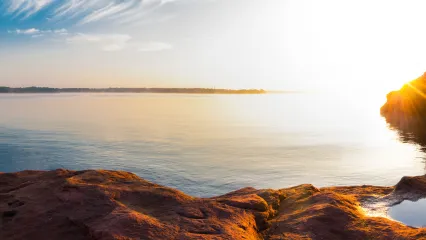 Sam Cooper/RPS 2014
Sam Cooper/RPS 2014Lake Thunderbird
Lake Thunderbird is a sneaky good fishery. It has great sizable populations of just about every sought after game species. There is great public access lake-wide with plenty of places to find catfish from the banks year-round. Lake Thunderbird has a pretty well defined river channel on the south end of the lake with connecting points to rocky and sandy shoals. The coves at all of the public access areas are the easiest places to bank fish. Some public access areas may have fees associated with entrance or facilities. Click here for Lake Thunderbird State Park information.
Fishing Tips
Submitted by Aquatic Education/R3 Fishing Coordinator Skylar St.Yves
Lake Thunderbird has a healthy population of channel, blue and flathead catfish, but blue catfish tend to be the most productive. The lake is full of great eater-sized blues ranging in the two to six pound class.
The Little River channel is the ideal spot to target catfish, especially blue catfish. Bank anglers have easy access to the channel from the riprap along the Alameda Bridge. Parking can be found at North Sentinel, West Sentinel and East Sentinel parks.
The best bait is fresh caught gizzard shad cut in half; the tail end of the shad tends to be more productive than the head half.
Thread the shad piece onto a thick wire hook, such as a circle or octopus hook, and attach a piece of split shot to the line a few inches above the hook. Then place a fixed bobber to the line two to three feet above the hook or fish it off the bottom with weight.
Jug-lining fresh cut shad is productive for boat anglers along the Little River channel breaks and bends as well as along the dam.
A live sunfish fished off the bottom with weight is productive in the Hog Creek drainage for flathead catfish. Bank access can be found here.
Channel catfish are good lake-wide from shorelines in the late evening and overnight hours. Stink bait or a live worm are the best bait options either fished below a bobber or off the bottom with weight.
The best fishing for catfish usually occurs from late April through early June.
Fishing Contact
Game Warden
Operator
Bureau of Reclamation / Oklahoma State Parks
Location
Lake Thunderbird (Google Map) is located 12 miles east of Norman on SH 9.
Drive Time
From OKC - 40 minutes
From Tulsa - 1.75 hours
From Norman - 25 minutes
Recreational Facilities
Oklahoma State Parks manages campgrounds with full RV hookups, fishing docks, fishing jetties, boat ramps, picnic areas, an archery range and two marinas.
Find a Fishing Campground
Other Fish Species of Interest
Bait & Tackle Nearby
Little River Marina
Calypso Cove Marina
Alameda Market
Walmart Supercenter
Physical Description
Surface area - 5,377 ac.
Shoreline length - 59.6 mi.
Volume - 106,670 ac. ft.
Maximum depth - 58 ft.
Management Practices
Fish surveys are conducted every five years. Brush piles are put in the lake for fish habitat in addition to fish stockings.
Lake Thunderbird Level Data
Additional Information
- Wes Watkins

Wes Watkins Reservoir
Operated by the City of Mcloud. Wes Watkins Reservoir maintains one recreation area (North Deer Creek), three boat ramps, picnic tables, pavilions, camping and restrooms.
Fishing Tips
Submitted by Fisheries Biologist Michael Hollie
Wes Watkins Reservoir located only 30 minutes east of Oklahoma City offers quality channel catfish.
Channel catfish can be found lake-wide, however bank anglers can find success fishing from the North Deer Creek Recreation Area in the shallows or along the rock jetty.
Channel catfish can be caught using live worms, punch bait, and stink bait fished off the bottom or under a bobber.
Wes Watkins is owned and operated by the City of Mcloud, and may require a fee for recreational activities.
Fishing Contact
Game Warden
Operator
Location
Wes Watkins Lake (Google Map) is located 2 miles north of I-40 off of exit 176 on OK-102 (S. Mcloud Rd.).
Drive Time
From OKC - 30 minutes
From Tulsa - 1.5 hours
From Shawnee - 20 minutes
Recreational Facilities
City of McCloud manages campgrounds with full RV hookups, three boat ramps, restrooms, fishing docks and designated swimming areas.
Other Fish Species of Interest
Management Practices
Northern largemouth bass are stocked periodically.
Bait & Tackle Nearby
Alameda Market
Walmart Supercenter
Bass Pro Shops
Walmart Supercenter
Our Acres Bait Shop LLC
Walmart Supercenter
Walmart Supercenter
Calypso Cove Marina
Little River Marina
Walmart Supercenter
Physical Description
Surface area - 1,142 ac.
Shoreline length - 17 mi.
Maximum depth - 31 ft.
Volume - 14,065 ac. ft.
Wes Watkins Level Data
Additional Information









